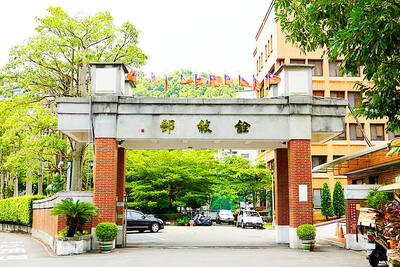Premier Chang Chun-hsiung (張俊雄) said yesterday that Taiwan's inclusion on the planned "overseas" route of the torch relay for next year's Olympic Games is acceptable to the nation.
Taiwan rejected the original route announced by the Beijing Organizing Committee for the XXIX Olympiad (BOCOG) on April 26 because it included Taiwan as China's first "domestic" stopover and would have seen the torch arriving in Taiwan from Vietnam before heading on to Hong Kong. The arrangement was viewed as an intentional move to cast aspersions on the nation's sovereignty.
The two sides later started negotiations on the issue, and Beijing seemed to have softened its stance when it changed "Taipei, China" to "Chinese Taipei" after a protest was lodged with the International Olympic Committee (IOC) by the Chinese Taipei Olympic Committee.
However, the Mainland Affairs Council (MAC) had insisted that four prerequisites be met before the torch could pass through Taiwan -- that China follow IOC protocol and regulations, that the government of Taiwan must approve the route, that Taiwan's sovereignty not be downgraded and that all relevant activities be conducive to future interaction between the two sides.
Chang's comments came after the organizers of the Beijing Olympics said on Thursday night that the torch relay would commence in Beijing on March 31 next year and visit 22 overseas cities on five continents and 113 cities and regions in China.
Jiang Xiaoyu (蔣效愚), executive vice president of the BOCOG, stated again that the committee would like to include Taipei as a stop on the torch's route, a news release from China's Taiwan Affairs Office said.
This time, Jiang called Taipei "one of the 22 overseas cities."
When asked to comment on Jiang's statement, MAC Chairman Chen Ming-tong (陳明通) yesterday reasserted that Taiwanese would welcome the Olympic torch as long as the nation's status as a sovereign state was not degraded.
"The term `overseas' is certainly a more neutral way to say it," Chen said.
However, Chen said that only a tentative consensus had been reached on the route during a press conference held at the council's offices.
"The two sides are only one step away from signing an agreement [on the torch route], but that step may be one step too far if side issues are raised," Chen said.
He declined to elaborate.
"I will not disclose what those side issues may be, but I believe Beijing will definitely understand what they are," Chen said.
He said he would only "clarify everything after an agreement is signed."
Chen backed his statement with the results of a survey conducted on Monday and Tuesday, which showed that 78.5 percent of respondents would like the Olympic torch to pass through Taiwan if China does not degrade Taiwan's status. Describing the nation as one of the "overseas" stops was acceptable to 58 percent of respondents.

Taiwan Semiconductor Manufacturing Co (TSMC, 台積電) is expected to start construction of its 1.4-nanometer chip manufacturing facilities at the Central Taiwan Science Park (CTSP, 中部科學園區) as early as October, the Chinese-language Liberty Times (the Taipei Times’ sister newspaper) reported yesterday, citing the park administration. TSMC acquired land for the second phase of the park’s expansion in Taichung in June. Large cement, construction and facility engineering companies in central Taiwan have reportedly been receiving bids for TSMC-related projects, the report said. Supply-chain firms estimated that the business opportunities for engineering, equipment and materials supply, and back-end packaging and testing could reach as high as

CHAMPIONS: President Lai congratulated the players’ outstanding performance, cheering them for marking a new milestone in the nation’s baseball history Taiwan on Sunday won their first Little League Baseball World Series (LLBWS) title in 29 years, as Taipei’s Dong Yuan Elementary School defeated a team from Las Vegas 7-0 in the championship game in South Williamsport, Pennsylvania. It was Taiwan’s first championship in the annual tournament since 1996, ending a nearly three-decade drought. “It has been a very long time ... and we finally made it,” Taiwan manager Lai Min-nan (賴敏男) said after the game. Lai said he last managed a Dong Yuan team in at the South Williamsport in 2015, when they were eliminated after four games. “There is

Democratic nations should refrain from attending China’s upcoming large-scale military parade, which Beijing could use to sow discord among democracies, Mainland Affairs Council Deputy Minister Shen You-chung (沈有忠) said. China is scheduled to stage the parade on Wednesday next week to mark the 80th anniversary of Japan’s surrender in World War II. The event is expected to mobilize tens of thousands of participants and prominently showcase China’s military hardware. Speaking at a symposium in Taichung on Thursday, Shen said that Chinese Minister of Foreign Affairs Wang Yi (王毅) recently met with Indian Prime Minister Narendra Modi during a visit to New Delhi.

FINANCES: The KMT plan to halt pension cuts could bankrupt the pension fund years earlier, undermining intergenerational fairness, a Ministry of Civil Service report said The Chinese Nationalist Party (KMT) caucus’ proposal to amend the law to halt pension cuts for civil servants, teachers and military personnel could accelerate the depletion of the Public Service Pension Fund by four to five years, a Ministry of Civil Service report said. Legislative Speaker Han Kuo-yu (韓國瑜) on Aug. 14 said that the Act Governing Civil Servants’ Retirement, Discharge and Pensions (公務人員退休資遣撫卹法) should be amended, adding that changes could begin as soon as after Saturday’s recall and referendum. In a written report to the Legislative Yuan, the ministry said that the fund already faces a severe imbalance between revenue